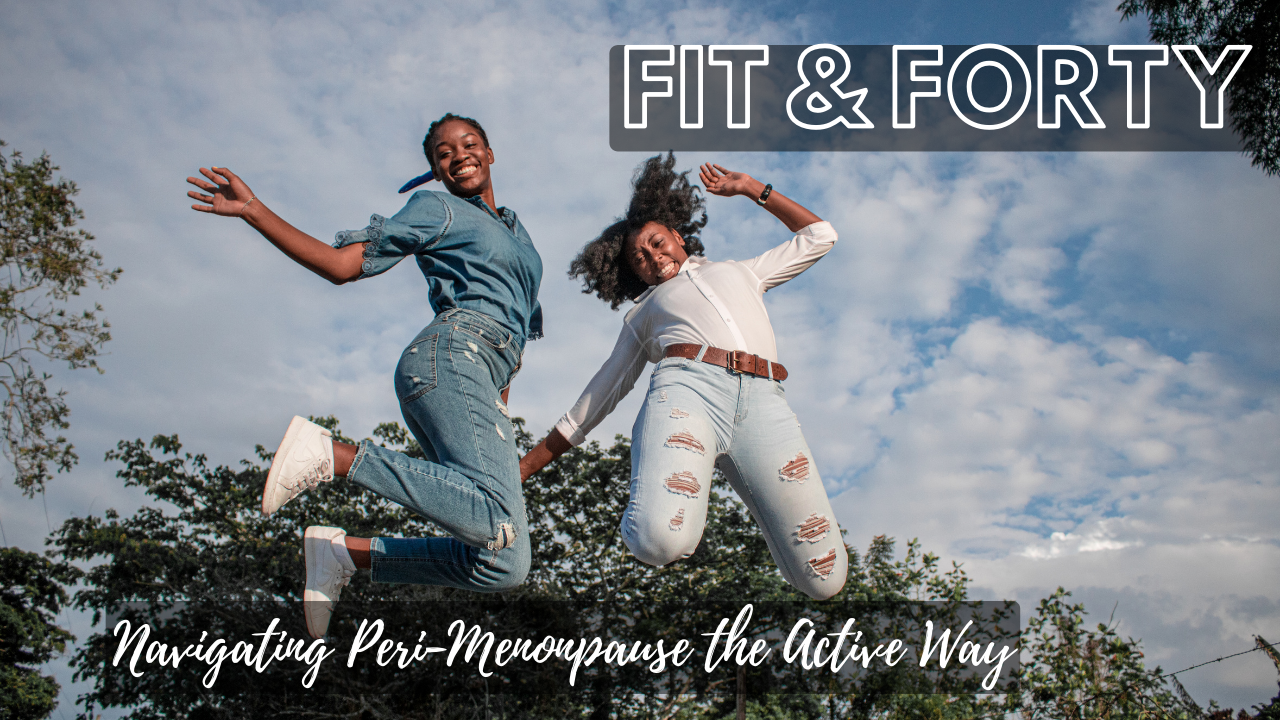Staying Fit in Your 40s: How Exercise Helps Navigate Peri-menopause
Jul 13, 2023
Hello, it's Jen! I'm here today to talk about something that many of us in our fabulous 40s are navigating - peri-menopause and if I'm honest not something that was on my radar until very recently.
When I got a text from my Mum early one morning when on the school run announcing that she thought I was peri menopausal my jaw hit the floor. I had thought that the menopause was several years away (which it still could be) and that I would breeze through it like I had my teenage hormonal changes. To be honest I hadn't really given it much thought as I didn't think it was happening anytime soon and was far too busy doing 'life' albeit with a slightly foggy, mushy brain! But give it some thought I did, and specifically how would it affect my active lifestyle.
The good news is, exercise can actually be one of our best allies during this transitional stage. Let's delve into how staying active helps us maintain our health, wellness, and sanity during peri-menopause.
Understanding Peri-menopause
Before we dive in, let's clear up what peri-menopause is. It's the transitional stage that leads up to menopause, the point when our ovaries stop releasing eggs. This transition typically starts in our 40s (but can begin in the 30s too) and can bring about a whole host of changes, thanks to fluctuating hormone levels. From hot flashes and mood swings to sleep issues and changes in menstrual cycles, peri-menopause is quite the rollercoaster!
The Power of Exercise
Exercise is an incredibly powerful tool during peri-menopause for several reasons.
-
Hormone Balance: Regular physical activity can help balance our hormones. It aids in regulating the production of stress hormones like cortisol and can also help boost serotonin (our happy hormone), which can often decrease during peri-menopause.
-
Mood Booster: Exercise is a natural mood booster. It can help manage symptoms of depression and anxiety that can often accompany peri-menopause, thanks to those feel-good endorphins it releases.
-
Bone Health: Weight-bearing exercises like running, walking, or strength training (have you tried our Sculpt class?) are vital during peri-menopause as they help increase bone density. This is particularly important as dropping oestrogen levels during peri-menopause can lead to an increased risk of osteoporosis.
-
Weight Management: Many women notice weight gain during peri-menopause, mainly due to hormonal changes. Regular exercise can help control weight gain and increase metabolism, making it easier to maintain a healthy weight.
-
Sleep Better: Regular physical activity can help improve sleep quality, a common issue during peri-menopause.
What Type of Exercise Works Best?
The best exercise during peri-menopause is the one you enjoy and will stick with! However, it's beneficial to incorporate a mix of cardio, strength training, and flexibility exercises.
Yoga and Pilates: As we at R1SE know these are excellent options as they combine strength, flexibility, and balance exercises, and they also have a fantastic calming effect on the mind.
Cardio: Cardio exercises like running, swimming, cycling, or brisk walking can help with heart health and weight management.
Strength Training: Strength training exercises can be incredibly beneficial for maintaining muscle mass and supporting bone health.
Remember, it's essential to listen to your body and adjust your workouts accordingly. Some days, a high-intensity workout might feel great. Other times, a gentle yoga session might be just what you need.
In the context of peri & the menopause, overtraining could exacerbate symptoms such as fatigue, sleep disturbances, mood swings, and hormonal imbalances. Moreover, chronically high levels of the stress hormone cortisol (which could be elevated due to overtraining) can contribute to weight gain or difficulties losing weight. High cortisol levels can lead to increased appetite and cravings for high-sugar, high-fat foods.
As I mentioned above, balanced exercise is key. This means incorporating a mix of cardio (for heart health and calorie burning), strength training (to maintain muscle mass, which naturally decreases with age), and flexibility or restorative exercises like yoga and Pilates (for balance, flexibility, and stress management).
Also, remember that nutrition plays a significant role in weight management during menopause. Eating a diet rich in lean proteins, fruits, vegetables, and whole grains can help you maintain a healthy weight and support overall health during this transitional period.
The Bottom Line
Staying active during peri-menopause isn't just about maintaining a healthy weight or physical fitness; it's about taking care of our mental health, boosting our mood, preserving our bone health, and ultimately, helping us navigate this transition with greater ease and vitality.
So, let's embrace these changes and keep moving. Because staying active isn't just something we do; it's a part of who we are. And remember, you're not alone on this journey. We're all in this together, staying strong, healthy, and vibrant, right through peri-menopause and beyond. Here's to our health and fitness, at every stage of life!
If you''re new to R1SE click below to check out our intro offer. 80 R1SE Credits to use in 2 weeks and see if we could help you be your best self.
Stay connected with news and updates!
Join our mailing list to receive the latest news and updates from our team.
Don't worry, your information will not be shared.
We hate SPAM. We will never sell your information, for any reason.

